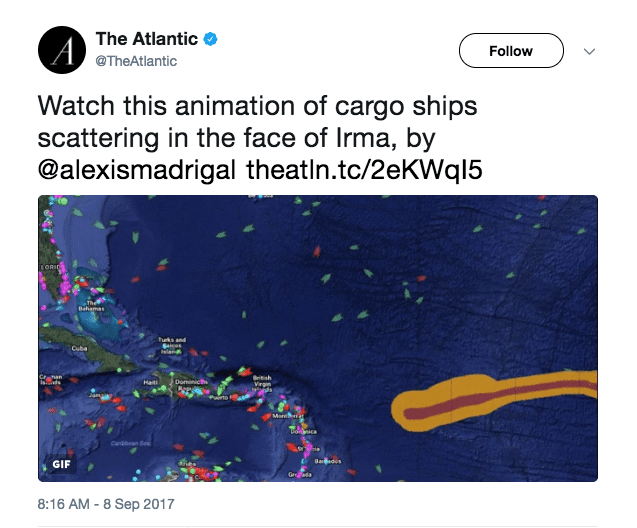The Importer’s Guide to Navigating Natural Disasters and Extreme Weather

The effect of hurricanes, floods, wildfires and other natural disasters on supply chains worldwide is growing year over year. The data proves it too: Since 2012, global supply chain management disruptions from extreme weather events have risen 29%, according to the Zurich Insurance Group and the Business Continuity Institute.
Recent hurricanes and other natural disasters have impacted the trade industry in visible ways. FTR Transportation Intelligence found that Hurricane Harvey, which recently hit Houston, affected 7% of the trucking industry for two weeks. Chief Economist Neil Perry of Truckstop.com said supply chains could be disrupted for months as the industry works around the problems caused by Hurricane Harvey. The hurricane also affected the Gulf Coast oil refineries and processing centers; gas prices rose to a 2-year high in anticipation of the storm.
Ocean freight has not fared any better. The Atlantic twitter posted a gif of cargo ships diverting course to avoid Hurricane Irma on its way toward Florida. Irma is expected to cause $20 to $40 billion in insured damage losses to personal, commercial and industrial properties in Florida.
The Impact of Natural Disasters On Your Business
The siege of natural disasters and extreme weather events led the Wall Street Journal to publish an article called Ignore Extreme Weather Threats at Your Supply Chain’s Peril. It’s a warning that many companies have not heeded, however. Few have taken steps to mitigate the impact of natural disasters and extreme weather events on their global supply chain management. Does that include you?
After all, any disruption to your global supply chain could cause you to lose customers. A surge in oil prices might eat away at your profit. If your suppliers can no longer get the parts they need to fulfill your orders, that too hurts your bottom line.
During and after natural disasters, it’s important to have plans in place to minimize their impact on your supply chain. Here is our guide to help you navigate natural disasters and extreme weather events that may affect your global supply chain management.
Communicate Often With Your Supplier, Freight Forwarder, and Customers
What makes all the difference during a natural disaster or extreme weather event? Great communication does. Long before a natural disaster hits, choose suppliers and an international freight forwarder that excel at communication and prioritize your business. By working with these type of business partners, you are directly influencing your relationship with your customers too. How, you might ask? Let’s look at the benefits:
- Supplier: For more predictable natural disasters or extreme weather events (e.g., a hurricane or flood), be proactive and reach out to your supplier beforehand. Don’t wait until the disaster happens. Find out how your supplier plans to mitigate the impact of the upcoming event. Arrange for your freight shipments to be sent out earlier to avoid any potential delays. Get a timetable for when they plan to be up and running again.
- Freight forwarder: A freight forwarder that prioritizes your business should alert you to weather events that might affect your shipments, and provide solutions on how to minimize delays in your supply chain. (See “Contingency Plans” for more information.)
- Customers: By having up-to-date information from both your supplier and freight forwarder, this enables you to inform your customers of any potential delays and new ETAs. Waiting until the last minute to inform them of a delay could cost you their business; being upfront about problems due to weather events allows them to be better prepared.
Know Your Weather Patterns and Risks
The devastating effects of natural disasters and extreme weather are not predictable, but we know when they are likely to happen. Knowing weather patterns and risks to you and your supplier’s region helps you plan and protect your global supply chain management.
Here is a general overview of weather events for the United States and Southeast Asia:
| Spring | Tornado season in Midwest/Southeastern part of US (March to June) |
| Summer |
Hurricane season in United States/Caribbean (June to November); flooding as a result of hurricanes
Monsoon/typhoon season in Southeast Asia (May to November depending on the region, with a peak in August); flooding due to typhoons. |
| Fall | Wildfire season in the western United States (October to January) |
| Winter | Snowstorms and freezing temperatures in the United States; rainstorms and flooding in the western United States; both can shut down roads, disrupt power, etc. |
Earthquakes are one natural disaster that we can’t predict with significant warning time. These events can cause tsunamis in Southeast Asia and major infrastructure damage in the Western United States.
Create Contingency Plans
Contingency plans for natural disasters can mean all the difference in how your business survives it.
Create backups of your data and use the cloud: Is all your data, documentation, and other paperwork on your computers at work? If a natural disaster hits your area, that could mean the loss of your data. Avoid that by working with your IT department to create backups of your information and use software that saves your data in the cloud. That way, even if the worst happens, all your data is secure and accessible.
Work closely with your freight forwarder: A good freight forwarder not only alerts you to weather events or natural disasters that impact your shipments, but they also provide solutions for you. For example, if they know a hurricane is about to hit the Gulf Coast, your international freight forwarder can arrange alternative shipping routes if your shipment has not left port yet. That could include rerouting your shipment to another port. Air freight may also be an option for more urgent shipments. Your freight forwarder cannot eliminate the risks that come from natural disasters, but they can play an important role.
How are you planning to reduce the impact of natural disasters in your global supply chain management?
Dedola Global Logistics can help by providing you with freight tracking tools that provide updates on weather events and save key documentation about your shipments. They also work with you to keep your shipments schedule as smooth as possible during a natural disaster.
Schedule a consultation with us today.

Contact Us


